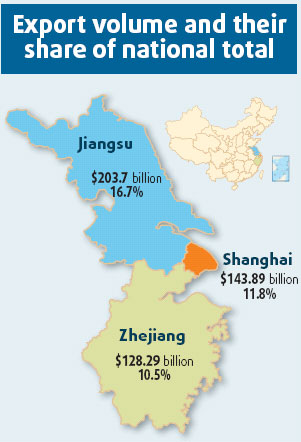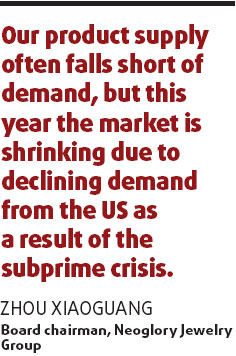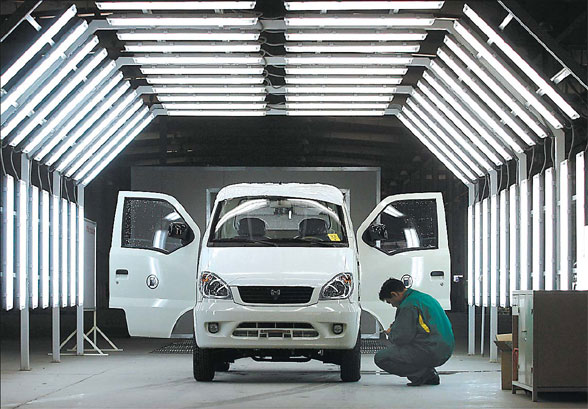Moving on from the low-cost era
|
A worker inspects an electric car to be shipped to the US at the Qingyuan Electric Vehicle Co Ltd in Tianjin. Exporters are shifting toward high value-added products such as clean energy vehicles. File photo |
It's a challenging time for manufacturers, as the yuan appreciates and raw material, labor and environment-protection costs increase.
But the changing landscape also affords these manufacturers the opportunity to make the switch from cheap consumer goods to high value-added products.
In January, China's exports expanded 26.7 percent year-on-year to $109.66 billion. Although the growth rate is high, it was 6.2 percentage points lower than for last January.
The Asian Development Bank predicts China's export growth will ease to 19 percent for this year and to 18 percent in 2009.
"Our product supply often falls short of demand, but this year the market is shrinking due to declining demand from the US as a result of the subprime crisis," Zhou Xiaoguang, board chairman at Yiwu-based Neoglory Jewelry Group, the world's largest jewelry producer, said.
"We could face a 5 percent drop in profit due to rising material costs, the value-added tax rebate, increasing labor costs and the renminbi's appreciation."
Businesses also say they're feeling the pinch under the new Labor Contract Law.
"The new labor law should be amended to protect business interests, too," Zong Guyin, chairman of sock maker Zhejiang Mengna Knitting Co Ltd, said.

"If employees aren't satisfied, they can turn to the labor bureau for help. But who helps us if an employee breaks a contract? The labor bureau just tells us to find another migrant worker and don't worry about it."
Zong said his costs and business risks are higher under the new law, which requires pensions and insurance cover for employees who've been with a company for more than 10 years.
Some small manufacturers have already folded in the traditional manufacturing stronghold Pearl River Delta, unable to absorb the 30 to 50 percent jump in costs in the past 12 months.
The Chinese Manufacturers' Association of Hong Kong expects thousands more will be forced to close or merge this year.
The industrial landscape is changing, consulting firm Booz Allen Hamilton said in a report last month. "The era of China as a low-cost, manufacturing-for-export market has come to an end."
It said that while a stronger currency and rising wages is putting pressure on manufacturing margins, manufacturers' failure to incorporate best practice and fully leverage market growth and resources has also cut into profits.
"China's changing cost and currency structure has shifted, forcing companies to rethink how they structure their Chinese operations and how they perceive China in their overall global strategy," Booz Allen vice-president Ronald Haddock said.
"At the same time, China is increasingly a major source of product and business model innovation. We're seeing globalization at work and China's role has changed."
This change could be positive for China's long-term development as companies are forced to shift from low-cost manufacturing to innovative, more environment-friendly products.
Many manufacturers are trying to find ways to become more competitive.
"Our company reduces production costs by optimizing management and improving the technical process," Wang Jinfang, president of Hangzhou Jintai Belt Co, said.
"We've boosted production output to reduce costs. For example, the production cost is almost the same for 5,000 or 10,000 tons."
Wang also encourages employees to save energy. For every 1 kWh of electricity saved, two-thirds of the saved cost goes directly to employees.
Zhang Chenming, board chairman of Baoyi Group based in Wenzhou, said the valve manufacturer will boost exports this year by upgrading technology and improving quality.
He believes only high-quality and innovative products can win out in overseas markets in the long term.
To offset the effect of the rising yuan, when Baoyi signs a contract, it projects a yuan exchange rate for the time when goods will be sent out.
But for other small businesses that lack the funds to expand research and technical investment, the domestic market could come to the rescue.
In 2007, retail sales growth jumped to an eight-year high at 16.8%, while consumption overtook investment to become the largest contributor to the nation's economic growth for the first time since 2001.
(China Daily 04/15/2008 page39)















